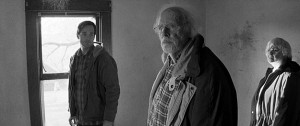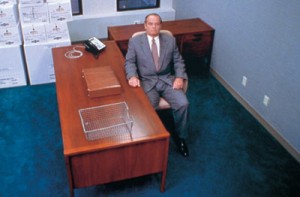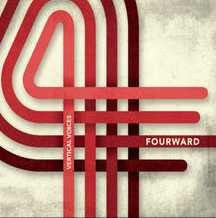 Mrs. T and I have been catching up in recent weeks with a string of once-new films that slipped past us when they came out. On Wednesday we finally got around to Nebraska, which we both found deeply moving.
Mrs. T and I have been catching up in recent weeks with a string of once-new films that slipped past us when they came out. On Wednesday we finally got around to Nebraska, which we both found deeply moving.
It surprises me in retrospect that we didn’t make more of an effort to see Nebraska two years ago. Alexander Payne, after all, is one of the very few contemporary film directors who speaks for me. I know his world—I grew up in it—and his feeling for the parts of America that figure in his films is precise and perfect. (Likewise Mark Orton’s score for Nebraska, which is as beautifully plain and direct as the film itself.)
 Part of what draws me to Payne’s work is that I have a special fondness for “satire” so close to literal representation as to be all but indistinguishable from it. That’s his specialty, and it’s what Nebraska is like. At times, in fact, it almost suggests a satirical version of The Trip to Bountiful. Yet just behind the comedy is an emotional affekt similar to that of Horton Foote’s masterpiece, whose simple but profound plot is undoubtedly echoed in Bob Nelson’s screenplay. Yes, Nebraska is funny—but all the laughter hurts.
Part of what draws me to Payne’s work is that I have a special fondness for “satire” so close to literal representation as to be all but indistinguishable from it. That’s his specialty, and it’s what Nebraska is like. At times, in fact, it almost suggests a satirical version of The Trip to Bountiful. Yet just behind the comedy is an emotional affekt similar to that of Horton Foote’s masterpiece, whose simple but profound plot is undoubtedly echoed in Bob Nelson’s screenplay. Yes, Nebraska is funny—but all the laughter hurts.
I reviewed Payne’s Election, About Schmidt, and Sideways in Crisis, and the second of those reviews also hints at the way I felt about Nebraska. Here it is, reprinted for the first time since it originally appeared in 2003.
* * *
In Hollywood, ordinary middle-class life is a state to be escaped, not examined. Unlike their novel-writing counterparts, American filmmakers are almost never willing to set a serious drama in a believable-looking small town (Kenneth Lonergan’s masterly You Can Count on Me was a rare exception) or even a medium-sized city anywhere other than on the East or West Coasts. To them, the vast expanse of terra incognita known in New York and Los Angeles as “flyover country” is little more than a breeding ground for cross-burners, serial murderers, and Republicans.
This iron law applies with particular force to the part of America where I was born and raised. It happens that I am writing this month’s column in a small midwestern town, the sort of place whose existence is all but unknown to most movie directors. As I unspooled a decade’s worth of memorable films in my head, I was hard-pressed to think of any that conveyed the slightest sense of what it looks and feels like to live in Red America. It’s revealing that the first ones to come to mind were Waiting for Guffman and Election, both of which are satires.
Now Alexander Payne, the director and cowriter (with Jim Taylor) of Election, has returned to Omaha, Nebraska, to make a very different sort of movie about life among the regular guys. To be sure, About Schmidt is also a satire, but its comic effects are much less broad than those of Election—indeed, you almost have to come from the Midwest to know that Payne and Taylor are exaggerating anything at all. Had Payne cast an actor other than Jack Nicholson, who is incapable of understatement, to play the part of Warren Schmidt, a superfluous middle manager whose tightly wrapped life unravels when he is nudged into the comfortable oblivion of retirement, it might well have been possible to take About Schmidt at something close to face value.
As it is, Nicholson does his best to keep from over-egging the pudding, but for all his palpably good intentions, I kept wishing that Payne had cast someone more like William H. Macy. But, then, you can’t make a big-budget movie without at least one big-budget star, and Nicholson is more than good enough to make About Schmidt much more than plausible. Even with Nicholson, it is one of the very best movies about which I have been lucky enough to write in this space.
 Like Barbershop, another fine film that seeks to show the world as it is, About Schmidt doesn’t have much of a plot. Warren Schmidt is settling uneasily into a boring retirement when he comes home one day and finds his wife, Helen (June Squibb), dead on the floor of their kitchen. The shock of her death throws him into a depression from which he seeks to extract himself by driving from Omaha to Denver in his motor home, there to visit his soon-to-be-married daughter, Jeannie (Hope Davis, one of the best of the many fine actresses to come out of the indie-flick movement). Randall, Jeannie’s fiancé (Dermot Mulroney), is a long-haired waterbed salesman whose family never quite got over the Sixties. Jeannie loves him, but Schmidt loathes him, and the prospect of seeing his only child vanish into a mediocre marriage forces him to take an unsparing look at his own unsatisfying life.
Like Barbershop, another fine film that seeks to show the world as it is, About Schmidt doesn’t have much of a plot. Warren Schmidt is settling uneasily into a boring retirement when he comes home one day and finds his wife, Helen (June Squibb), dead on the floor of their kitchen. The shock of her death throws him into a depression from which he seeks to extract himself by driving from Omaha to Denver in his motor home, there to visit his soon-to-be-married daughter, Jeannie (Hope Davis, one of the best of the many fine actresses to come out of the indie-flick movement). Randall, Jeannie’s fiancé (Dermot Mulroney), is a long-haired waterbed salesman whose family never quite got over the Sixties. Jeannie loves him, but Schmidt loathes him, and the prospect of seeing his only child vanish into a mediocre marriage forces him to take an unsparing look at his own unsatisfying life.
One of the smartest things about Election was Alexander Payne’s refusal to let any of his characters off easy, even the ones with whom he might well have been expected to sympathize. Yes, Schmidt’s life has been emotionally constricted, but that didn’t make it altogether meaningless; yes, Randall and his family are more open to experience, but this openness has not made them better than Schmidt, just different. Most filmmakers make it agonizingly clear which side they’re on, but in About Schmidt as in Election before it, Payne casts a cold eye on all he sees. (It tells us everything we need to know about Randall, for instance, that he and Jeannie walk down the aisle to the insipid strains of Dan Fogelberg’s “Longer.”)
Interestingly enough, the only aspect of midwestern life about which About Schmidt has nothing interesting to say is religion. Warren Schmidt is experiencing a full-blown spiritual crisis, one whose seriousness is in no way diminished by his own smallness of soul, and it is surprising—to put it mildly that at no time in the course of the movie does he look to religion, organized or otherwise, as a possible source of enlightenment or solace. One could easily imagine his having been left in the lurch by the spiritual blandness of latter-day mainline Protestantism, in much the same way that Kenneth Lonergan skewers the sin-free Methodism of the clergyman he plays in You Can Count on Me. Yet in a film otherwise notable for its uncanny fidelity to fact, it is impossible to forget that a couple like Warren and Helen Schmidt would almost certainly have been fairly regular churchgoers in real life.



 The truth is that my presence isn’t required at the Wallis, which is presenting what’s called a “remount” of the 2014 off-Broadway production of my first play. Same set, same actor and director, same staging, and—yes—the same script. When Dramatists Play Service
The truth is that my presence isn’t required at the Wallis, which is presenting what’s called a “remount” of the 2014 off-Broadway production of my first play. Same set, same actor and director, same staging, and—yes—the same script. When Dramatists Play Service  The best jazz vocal group I’ve ever heard just made its New York debut.
The best jazz vocal group I’ve ever heard just made its New York debut. First came Fourward, a newly released CD on which Julia, Kerry, Jennifer, and Greg sing a wide-ranging, engagingly varied program of songs and compositions by everyone from Johnny Mandel to Pat Metheny, whose music, like that of Maria Schneider, has been an “integral part” (as they put it) of the inspiration for Vertical Voices. Then the quartet started appearing at vocal jazz festivals, and on Saturday Vertical Voices came to New York to sing a one-nighter at Subculture, a newish Greenwich Village nightclub that shares space with the
First came Fourward, a newly released CD on which Julia, Kerry, Jennifer, and Greg sing a wide-ranging, engagingly varied program of songs and compositions by everyone from Johnny Mandel to Pat Metheny, whose music, like that of Maria Schneider, has been an “integral part” (as they put it) of the inspiration for Vertical Voices. Then the quartet started appearing at vocal jazz festivals, and on Saturday Vertical Voices came to New York to sing a one-nighter at Subculture, a newish Greenwich Village nightclub that shares space with the  While Julia is perfectly capable of stepping back and blending with her colleagues whenever the music calls for it, her unique sound adds a personal color to all of the group’s ensemble work, and each time she solos, the whole room sits up as one and takes notice. Yet Vertical Voices really is a group, not a solo act in disguise: Jennifer and Greg are first-class singers (and arrangers) in their own right, and Kerry’s gorgeous charts, with their wide-spaced harmonies and tingling dissonances, are as good as postmodern vocal-group writing gets. The result was an exhilarating evening of jazz that will echo in my memory for a long, long time to come.
While Julia is perfectly capable of stepping back and blending with her colleagues whenever the music calls for it, her unique sound adds a personal color to all of the group’s ensemble work, and each time she solos, the whole room sits up as one and takes notice. Yet Vertical Voices really is a group, not a solo act in disguise: Jennifer and Greg are first-class singers (and arrangers) in their own right, and Kerry’s gorgeous charts, with their wide-spaced harmonies and tingling dissonances, are as good as postmodern vocal-group writing gets. The result was an exhilarating evening of jazz that will echo in my memory for a long, long time to come. 
 Gene Glimmer (Michael Ehlers), Mr. Leight’s fictionalized father, is a journeyman trumpeter who got his start in the big bands of the ‘40s and lived long enough to see the swinging musical culture of his youth pulverized by the rise of rock. Dedicated to his art to the point of obsession, he neglects his family, and his blank inaccessibility drives Terry (Kate Buddeke), his wife, to drink and madness. Even though Mr. Leight sketches Gene’s nocturnal milieu in rich and revealing detail, “Side Man” is less a play about jazz than a life study of the open wounds in the flesh of a family at war with itself….
Gene Glimmer (Michael Ehlers), Mr. Leight’s fictionalized father, is a journeyman trumpeter who got his start in the big bands of the ‘40s and lived long enough to see the swinging musical culture of his youth pulverized by the rise of rock. Dedicated to his art to the point of obsession, he neglects his family, and his blank inaccessibility drives Terry (Kate Buddeke), his wife, to drink and madness. Even though Mr. Leight sketches Gene’s nocturnal milieu in rich and revealing detail, “Side Man” is less a play about jazz than a life study of the open wounds in the flesh of a family at war with itself…. American theater audiences can’t seem to get enough of Jane Austen. Having reveled last season in Bedlam Theatre Company’s scampering small-scale adaptation of Kate Hamill’s ingenious stage version of “Sense and Sensibility,” I now find myself reporting on the Chicago Shakespeare premiere of Paul Gordon’s chamber musical based on the same 1811 novel about the eternally diverting romantic misadventures of the Dashwood sisters—and it, too, is a winner.
American theater audiences can’t seem to get enough of Jane Austen. Having reveled last season in Bedlam Theatre Company’s scampering small-scale adaptation of Kate Hamill’s ingenious stage version of “Sense and Sensibility,” I now find myself reporting on the Chicago Shakespeare premiere of Paul Gordon’s chamber musical based on the same 1811 novel about the eternally diverting romantic misadventures of the Dashwood sisters—and it, too, is a winner.